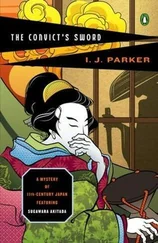I. Parker - The Crane Pavillion
Здесь есть возможность читать онлайн «I. Parker - The Crane Pavillion» весь текст электронной книги совершенно бесплатно (целиком полную версию без сокращений). В некоторых случаях можно слушать аудио, скачать через торрент в формате fb2 и присутствует краткое содержание. Жанр: Исторический детектив, на английском языке. Описание произведения, (предисловие) а так же отзывы посетителей доступны на портале библиотеки ЛибКат.
- Название:The Crane Pavillion
- Автор:
- Жанр:
- Год:неизвестен
- ISBN:нет данных
- Рейтинг книги:5 / 5. Голосов: 1
-
Избранное:Добавить в избранное
- Отзывы:
-
Ваша оценка:
- 100
- 1
- 2
- 3
- 4
- 5
The Crane Pavillion: краткое содержание, описание и аннотация
Предлагаем к чтению аннотацию, описание, краткое содержание или предисловие (зависит от того, что написал сам автор книги «The Crane Pavillion»). Если вы не нашли необходимую информацию о книге — напишите в комментариях, мы постараемся отыскать её.
The Crane Pavillion — читать онлайн бесплатно полную книгу (весь текст) целиком
Ниже представлен текст книги, разбитый по страницам. Система сохранения места последней прочитанной страницы, позволяет с удобством читать онлайн бесплатно книгу «The Crane Pavillion», без необходимости каждый раз заново искать на чём Вы остановились. Поставьте закладку, и сможете в любой момент перейти на страницу, на которой закончили чтение.
Интервал:
Закладка:
The main room behind the shop was hardly luxurious. Perhaps the son and daughter lived elsewhere. As it turned out, this was the case.
Nakamura’s daughter was a hard-featured, silent woman with the same protruding eyes as her brother. She barely nodded to Saburo. He was more interested in the partner who turned out to be a grossly fat man with the name Yasohachi Saito.
After explaining Saburo’s presence and asking him to sit down, the son said, “My uncle has met us here because we’re trying to go through my father’s accounts. It has all been very upsetting, as you may guess.”
“Your uncle?” Saburo asked, eyeing the fat man.
“My grandfather adopted him. He prefers to use his own name. What is it exactly that you can tell us?”
“As I said, I’m an investigator and happened to be in the Daikoku-yu just after Nakamura-san was found dead. Perhaps you have been told that your father was killed by a blind shampoo girl?”
They all nodded, looking at him intently.
“Well, there’s quite a bit of doubt about that. Nobody saw what happened, and the blind woman says she found him dead. It struck me that in such a case the victim’s family might be anxious to make certain that the real killer isn’t still free. Of course, I have no idea what your involvement in Nakamura-san’s business may have been, but if someone had a grudge against him …”
He let this sink in. Their expressions ranged from looking startled to becoming positively alarmed.
“Well,” he went on, “you see my reasoning. It occurred to me that you might like to have someone take a closer look to make sure that you are quite safe.”
The word “safe” caused some additional panic.
“What do you mean?” cried the daughter.
“What are you talking about?” growled the fat Saito. “Why should we worry? The woman has been arrested.”
Saburo pursed his lips. “The money-lending business is difficult. People are your friend when they want you to lend them your gold, but when you ask for its return along with your fees, they suddenly hate you. Isn’t that right?”
They looked at each other. The son spoke first. “You think that someone hated my father enough to kill him and may do the same to us?” His sister cried out in alarm and clutched his arm.
Saito snapped, “That’s nonsense. This is a business like any other.”
“I assume you know your creditors and whether any among them are desperate enough to cancel a debt by murder?” Saburo asked him.
Saito fixed Saburo with a cold eye. “I’m not directly involved in my brother’s business. Manjiro handles the books. But I think what you say is ridiculous. In my opinion, you just want to make money from our loss. Seeing that my brother’s children are still dealing with their grief, I consider that despicable. If this were my house, I’d throw you out.”
The son gasped and got to his feet. “Is that right?” he asked Saburo. “Are you selling us some sort of service?”
“No. You haven’t been listening. I work for Lord Sugawara. You don’t owe me anything. But I see that you don’t want my help.” He sighed and got to his feet. “Sooner or later the police will come and check your books to find out who could have killed your father.”
Manjiro’s jaw dropped. “The police will look at our books?”
“They can’t do that,” Saito said, but he sounded uncertain.
Saburo turned away. “I can find my way out. Good luck!”
Nakamura’s daughter cried, “Wait. Perhaps we should listen. He doesn’t want any money. It couldn’t hurt to listen.”
Saburo decided that all three were equally greedy, though the son was perhaps a little less so. He had guessed correctly that an investigation of their business would reveal unsavory details. He really liked them for suspects in this murder and wondered how to discover if any of them had been to the bathhouse that morning. But instead of irritating them further, he asked, “Can you give me the names of people who owed your father money and either couldn’t pay or bore him a grudge because of his business practices?”
Saito snapped, “There’s nothing wrong with our business practices. They’re strictly standard in the city. Because we deal with unscrupulous people who’ll take our money and refuse to pay it back, we carry a big risk that they’ll run away with it.”
“And so you charge how much?”
They balked at answering. Finally Manjiro said, “A third or maybe a half in very risky cases.”
His sister added, “We barely break even at that. People are so unreliable.”
Saburo grimaced. At those rates, there should be a wide field of suspects. “Can you list those who were most desperate or might have reason to feel angry?”
Again Manjiro and Saito exchanged glances, then Manjiro nodded and got up. His sister finally recalled herself to her duties as a hostess and brought some wine and cups. The wine was atrocious. Saburo noticed that Saito did not drink it.
Saburo asked him, “Are there any others who might have had personal reasons to hate your partner? I believe he was quite well-known in the amusement quarter. Perhaps there was a woman whose husband or boyfriend resented him?”
Saito gave him a pitying look. “The women in the quarter work for money. Why should they or their relatives be resentful?”
Nakamura’s daughter shook her head when Saburo turned to her. “They’re cheap sluts,” she said in a venomous tone.
Saburo thought this interesting. Had her father’s amorous escapades threatened her security? It was another thing he could not ask about, so he said nothing.
Eventually Manjiro returned with a list of names. This he passed first to Saito, who scrutinized it, nodded, and handed it to Saburo.
As expected, it was long. Saburo heaved a mental sigh. He handed it back to Manjiro. “Mark those who might be most likely.”
Manjiro passed it to Saito who took the list and studied it. Then he rose and went to the desk to make marks next to several names.
Saburo asked a few more questions about the “marked” persons, and promised to return if he uncovered anything.
Outside, the rain had started. It was getting colder, and Saburo huddled into his robe as he hurried along.
*
The first of the desperate borrowers was a schoolmaster. His house was not far. As it turned out, it was not only modest, but in terrible condition. The roof was missing thatch and looked as though it was ready to collapse in places. The fence had been mended cheaply, and so had the gate.
Saburo opened it and splashed through puddles toward the house. Before he could reach the door, it opened and a woman looked out. She was pale, thin, highly pregnant, and accompanied by two small, skinny children who clung to her worn cotton gown.
Blinking against the rain, she ran a hand over her hair that was coming loose from the twist at her neck. “Yes?” she asked instead of a greeting. She looked frightened.
“Mrs. Kajiwara? My name’s Saburo. I work for Lord Sugawara.”
“Yes?” she said again, now looking puzzled rather than afraid.
“Would your husband be in?”
She nodded. “What is this about?”
Saburo gestured at the rain. “May I come in? It’s about Nakamura Minobe.”
Now the fear was back. Surely he could not have found his killer already. He looked at her and at the wide-eyed little children and hoped not.
She stepped aside, pulling the children with her, and gestured for him to come in.
The house was dark and-in the way of poor homes-smelled of cheap oil, cabbage, and beans. She led the way to the back.
There, in a larger room mostly empty of furnishings, they found the schoolmaster bowed over a desk. He was writing. Beside him lay a small stack of closely written pages. Somewhere, rainwater dripped from the ceiling.
Читать дальшеИнтервал:
Закладка:
Похожие книги на «The Crane Pavillion»
Представляем Вашему вниманию похожие книги на «The Crane Pavillion» списком для выбора. Мы отобрали схожую по названию и смыслу литературу в надежде предоставить читателям больше вариантов отыскать новые, интересные, ещё непрочитанные произведения.
Обсуждение, отзывы о книге «The Crane Pavillion» и просто собственные мнения читателей. Оставьте ваши комментарии, напишите, что Вы думаете о произведении, его смысле или главных героях. Укажите что конкретно понравилось, а что нет, и почему Вы так считаете.












